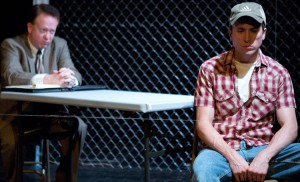Rebecca Gilman’s 1999 play, The Glory of Living, ambitiously revived in a shoestring production by Revolve Productions at The Access Theater, feels very timely indeed. With the horrific revelations of the torture and rape of three young women in Cleveland still fresh in the news, Gilman’s examination of two lethal losers resonates powerfully.
Gilman, whose play won an Evening Standard Award in London and set her on course to her better-known works, Spinning into Butter and Boy Gets Girl, splits the two acts of her play by letting us first get to know Lisa (Hannah Sloat), a reticent young woman whose rough-and-tumble home life is deftly outlined, and Clint (Hardy Pinnell), the roistering man who takes her away from it all and into a life of crime and sexual depravity.
Almost all the scenes in Act I progress over months and years. They take place around a bed in a motel room, where Clint, whose high spirits conceal a small, suspicious mind, gradually seeks more sexual fulfillment than Lisa (they have quickly married) can provide. It’s a good sign the marriage is in trouble when the pillow talk turns to “Your mother’s a drunk whore.”
Eventually the pair progress to kidnapping young women, and the compliant Lisa acts out Clint’s sexual fantasies. They involve luring young women into a vehicle and kidnapping them, drugging them and having sex. After that, the young women disappear. It’s a mark of Sloat’s affectless, sullen performance that she comes across as ambivalent about what she does; it’s not until Act II that one realizes something is fundamentally wrong inside her. Still, Lisa has a hang-up about leaving the women’s bodies in the wild for animals to find. She surreptitiously telephones police and guides them to the corpses. But that apparent kindness backfires once she is traced and she and Clint are arrested.
The second act examines Lisa during her incarceration for murder, and here set designer Alexandra Regazzoni provides stunning visual counterpoint. The first act is awash in bright colors and contrast. For the second, Regazzoni places a clear plexiglas wall between the audience and the action, with chain link fences on the other three sides, and a gray-and-black color scheme. It’s a nice touch, subtly emphasizing the danger the young woman poses. Tuce Yasak's lighting complements the concept: warm amber in Act I; harsh white fluorescents and pockets of darkness in the second. The inspiration carries over to Regazzoni’s apropos costumes — there’s a peach of a blouse for Lisa’s slutty mom in Act I that has a plunging neckline and weird pieces of cloth hanging from it; the blouse screams “trailer trash.” (The action is set in Alabama, though it might take place anywhere in rural America.)
As Act II unfolds, The Glory of Living (an ironic title, since almost nobody in the story has an smidgen of glory in their lives) assumes the routine of a Law & Order episode. Lisa meets with her court-appointed lawyer Carl, who tries to get her to help with her defense. Her descriptions of events suggest that Clint’s hold on her wasn’t absolute. Why didn't she flee? Why didn't she turn him in? Even after one has seen Clint’s brutality toward Lisa and his sexual hang-ups, Gilman relays enough ambiguity that one has to ask, “Is it possible Lisa is more dangerous than Clint?” Investing the production with unsettling silences and claustrophobia, director Ashley Kelly Tata maintains the uncertainty to the end; between what the authorities allege and what is shown to the audience, there is a gulf large enough to make one doubt that truth is ever discoverable in actual legal proceedings.
Tata has also gotten mostly good performances from the supporting team, especially Richard Hutzler as Lisa’s lawyer and Stephen James Anthony (the only Broadway veteran, from War Horse) as Steve, the boyfriend of one of the slain women; he survived Lisa’s attempt to kill him. They share a scene, and Anthony’s compelling performance melds regret, loneliness, bewilderment and anger into a memorable portrait of a victim/survivor, while Hutzler as the attorney treads a fine line to get information to help his client without alienating the witness.
The Glory of Living isn't an easy piece. For August entertainment, there is nothing frivolous or summery about it, but this ambitious production affirms Revolve as a troupe that's willing to tackle serious topics without regard to the temperament of the season.



